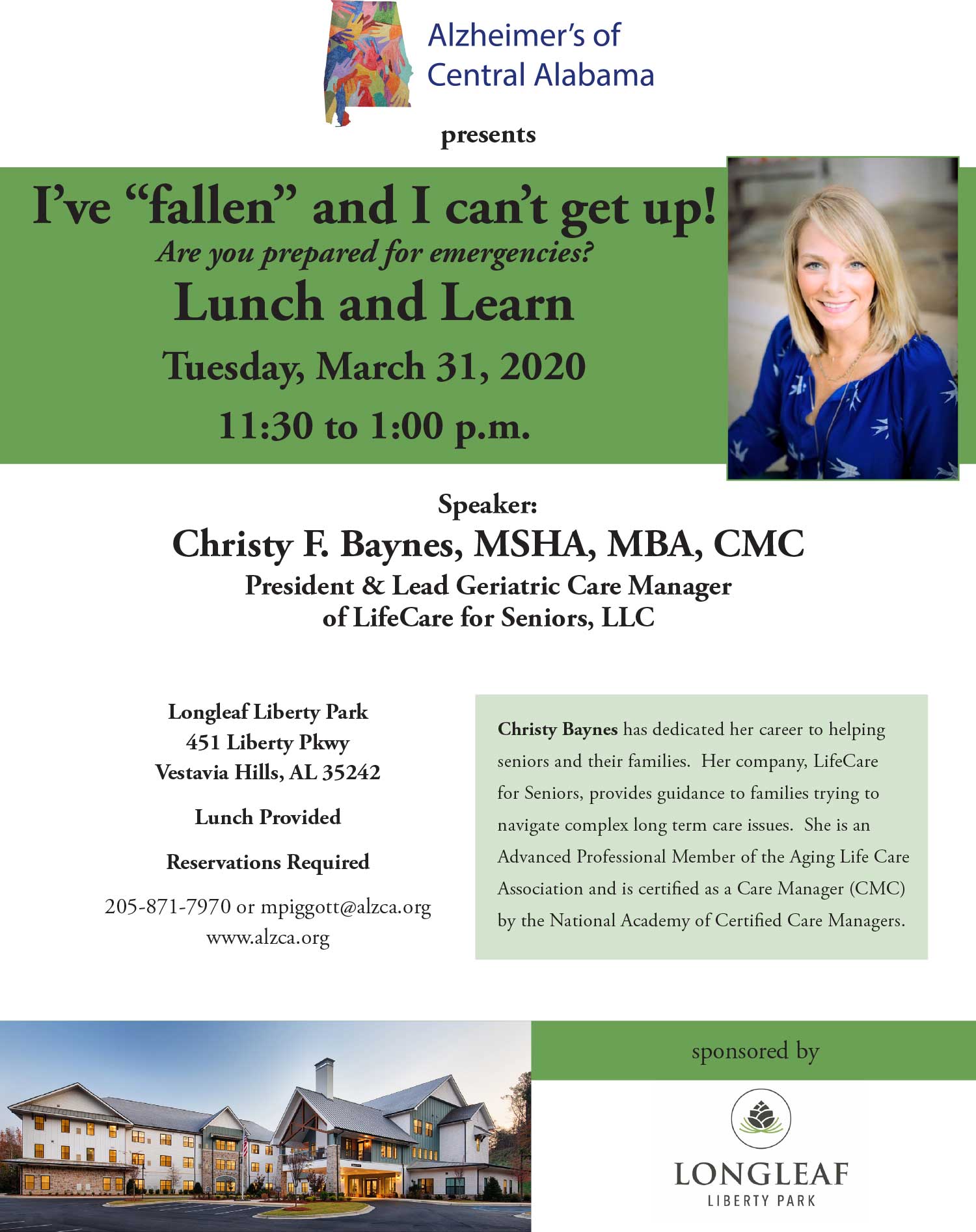Join a support group:
- March 10 & 24, 11 – 12:30, 300 Office Park Drive, Suite 225
- March 24, 6:30 – 8, Trussville First Baptist Church.
Crimson Community Café, Saturday, March 7, 10 – 11:30, UPerk, Tuscaloosa. Bring your loved one with dementia for free refreshments, live music and great company. For more info, see attached flyer or crimsoncommunitycafe@gmail.com
ACES: Active Caregiver Empowerment Tools, March 10, 10 – 11:30, Brookdale University Park. For more information contact Leanne Messer at kmesser@brookdale.com or 209-613-0688.
Stress Busting Program for Family Caregivers, 9:30 – 11 am, for 9 weeks starting March 2, at Caring Days in Tuscaloosa. Contact Nikki Poe at nikki.poe@westal.org.
Rojo is hosting a % of sales event to raise money for ACA’s Jr. Board and research, Tuesday, March 10, 5 – midnight. Rojo is a vibrant gathering place serving Latin & American dishes. 2921 Highland Ave, Birmingham.
 Ales for Alzheimer’s Saturday, March 21, 2 – 6 pm, at Avondale Brewery. The Jr. Board’s major spring fundraiser is a family friendly event featuring beer, food, music, a raffle and auction. All proceeds benefit ACA’s Pre Doctoral Scholars Program in Alzheimer’s Research at UAB.
Ales for Alzheimer’s Saturday, March 21, 2 – 6 pm, at Avondale Brewery. The Jr. Board’s major spring fundraiser is a family friendly event featuring beer, food, music, a raffle and auction. All proceeds benefit ACA’s Pre Doctoral Scholars Program in Alzheimer’s Research at UAB.
The UAB School of Nursing is offering a conference, “Strategies for Preventing & Managing Difficult Dementia Behaviors”, with Rita Jablonski, PhD, CRNP, FGSA, FAAN, Friday, March 27, 8:30 – 3:30. See Flyer
ACA Lunch & Learn, March 31, with Christy Baynes, President and Lead Geriatric Care Manager of LifeCare for Seniors. Her presentation, “Help, I’ve Fallen & I Can’t Get Up”, will offer solutions for difficult caregiving situations. Longleaf Liberty Park, 11:30 – 1. See attached flyer. Lunch is free but reservations are required, mpiggott@alzca.org or 205-871-7970.

News to know:
A March 4, 2020 Being Patient article and video interview discussed the heightened risk of people with dementia contracting the Coronavirus. A person with dementia may not even notice their own symptoms if they become ill. Being Patient Founder Deborah Kan spoke with geriatric psychiatrist Dr. James M. Ellison of Christiana Care, in Delaware, about what to look for, how to prepare and best ways to keep your loved ones safe. As of this morning, there are no known cases of Coronavirus in Alabama.
At ACA’s Jr. Board’s awareness event last week, Dr. David Standaert said high blood pressure is an important risk factor for Alzheimer’s. A new review combining data from more than 30,000 people over age 55 suggests that keeping your blood pressure under control with medications may help to fend off Alzheimer’s disease. Read More
A March 2, 2020 Scientific American article looks at tau and its link to Alzheimer’s disease. Long thought of as a ‘secondary player’ to amyloid, tau is now being regarded as a major factor in AD and therefore a viable target for drug development. “Researchers have only begun to understand what causes tau to turn toxic. A number of recent studies have suggested that the protein may take an aberrant turn after an inflammatory trigger, such as gum disease or an infection, or different conditions, such as “leaky gut,” in which microbes and other particles leak from the digestive system into the nervous system.”
Depression increases the risk of Alzheimer’s Disease: Researchers speculate that in some people, Alzheimer’s could be a long process that begins many years before the actual onset of memory loss, possibly showing up as symptoms of depression in the early stages of the disease. Alternatively, it is also possible that depression may in some way damage the brain, making it vulnerable to the ravages of Alzheimer’s and other forms of dementia. https://www.alzinfo.org/articles/diagnosis/depression-increases-the-risk-of-alzheimers-disease/
Brain Foods are those rich in antioxidants, vitamins, minerals, and healthy fats. They nourish both the body and the mind and help boost energy levels. Here are 10 Brain Foods to increase alertness and attention span while helping the mind process new information.
- Beets are high in antioxidants and nitrates. The former can prevent cancer and help the liver detoxify the blood, while the latter increases blood flow to the brain. Beets help the brain to think clearly and increase attention span.
- Avocado is a superfood high in monounsaturated fats. These healthy fats keep blood sugar at a steady level and help keep skin, hair, and nails healthy. Avocados are rich in folate and vitamin K, which improve cognitive brain functions like concentration and memory.
- Broccoli is high in both choline and vitamin K. These nutrients contribute to memory function and focus. The veggie also has lots of vitamin C and fiber.
- Dark chocolate increases blood flow to the brain, which improves all-around cognitive function. It is high in flavonols and has anti-inflammatory and antioxidant properties. Opt for varieties that are at least 70% cocoa. Milk chocolate and white chocolate are too high in refined sugars and other highly processed ingredients to provide the same health benefits as dark chocolate.
- Salmon is very high in omega-3 fatty acids, which can help reduce brain fog and increase memory and concentration. Studies show consuming foods high in these fatty acids could help reduce the symptoms of ADHD and lower the risk of developing certain cancers.
- Walnuts are rich in minerals, vitamins, and antioxidants. Snacking on walnuts can increase memory, alertness, and concentration. Studies show including walnuts regularly in one’s diet could help decrease the risk of Alzheimer’s disease.
- Blueberries protect the brain from toxins, degeneration, and stress. They have one of the highest antioxidant levels of any food and can help ward off certain cancers and aging, as well as protect against environmental toxins. Blueberries are also high in fiber and vitamin K, the latter of which regulates calcium in the bones and brain.
- Turmeric has strong healing and anti-inflammatory properties, thanks to the compound curcumin. The root has been popular in folk remedies for centuries, praised for its ability to heal wounds and ease illness. In the western world, turmeric is used to season foods, but even as a spice, these powers prevail, boosting overall immunity and oxygen intake in the brain, which increases alertness and focus.
- Rosemary protects the brain from the effects of neurodegeneration, which can cause or exacerbate Alzheimer’s disease and other age-linked conditions. It contains carnosic acid, an antioxidant that guards against chemical-free radicals that lead to degenerative disease. The herb also protects against stroke and decreases macular degeneration and other vision problems.
- Coconut oil is a diverse superfood. It has powerful anti-inflammatory properties and can boost memory and cognitive function.
https://facty.com/lifestyle/wellness/10-of-the-best-brain-foods/10/
People of color are more likely to be impacted by Alzheimer’s and other dementias. African Americans are two to three times more likely to develop Alzheimer’s than non-Hispanic whites, and Latinos are 1.5 times more likely. UsAgainstAlzheimers and A-LIST are partnering to understand what is meaningful to people of color touched by this disease. As part of this work, we want to better understand the needs and priorities of caregivers of color, including how caregiving affects health and quality of life. We’ll use this anonymous data to better inform care practices and health care provider education. To take part in this critical project, you’ll first be asked to sign an “Informed Consent” and then take a short survey. https://www.surveymonkey.com/r/UsA2_caregiver_challenges?uid=%5buid_value%5d&emci=84a87a66-be5c-ea11-a94c-00155d039e74&emdi=afcb2764-695d-ea11-a94c-00155d039e74&ceid=812012
AFTD Webinar Corticobasal Syndrome & Corticobasal Degeneration: Basics & What You Need to Know Webinar. Thursday, March 19th, 3 – 4:30 p.m., PRE-REGISTER for this event, so secure your spot today! The presentation will be recorded and archived on our website within one week of broadcast. Click here to view AFTD’s catalog of Educational Webinars.
Essay contest for teens: Hilarity for Charity is sponsoring Humans of Dementia: An Intergenerational Storytelling Contest with support from AARP, Generations United, Memory Well, and Associated Collegiate Press and National Scholastic Press Association. To be eligible, the writer must be currently enrolled in high school or college in the U.S. or Canada and the story must feature someone currently living with or who has passed away from Alzheimer’s disease or another dementia. Learn more on the Humans of Dementia submission webpage. The deadline is March 13. Humans of Dementia: An Intergenerational Storytelling Contest with support from AARP, Generations United, Memory Well, and Associated Collegiate Press and National Scholastic Press Association
Did you know? Planet Fundraiser is an app that lets you give back to non-profits, schools, and groups simply by taking a picture of receipts from merchants you already shop at. You shop and participating merchants donate to the charity of your choice.

You must be logged in to post a comment.